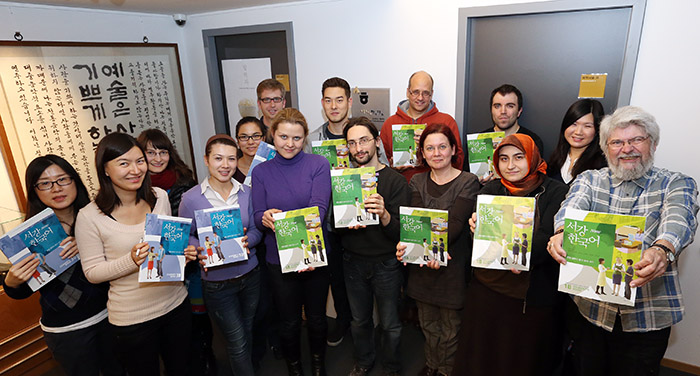
Indonesian students study the Korean language at the Korean Cultural Center in Jakarta. More than 72,000 test-takers worldwide registered for the 46th Test of Proficiency in Korean (TOPIK) that was administered on April 16 and 17 this year.
The popularity of the Korean language is showing tremendous growth.
For the 46th Test of Proficiency in Korean (TOPIK) that was administered worldwide this year on April 16 and 17, 72,295 test-takers sat the exam across 45 countries, in places as diverse as China, France, Australia, Argentina and South Africa.
The TOPIK is currently administered in 71 countries worldwide. The very first exam was held in 1997 in Korea, Japan, Uzbekistan and Kazakhstan. In the almost 20 years since, the number of countries has grown to 71, and the number of test-takers has grown 27 times. Test-takers were able to take the exam in Morocco for the first time this April, and starting in the second half of the year they will be able to take it in Bolivia, Jamaica and Poland, as well.
The TOPIK is an exam designed for adult language learners whose native language is not Korean. It tests grammar, writing, reading and listening. There are 6 levels in total: the elementary group (levels 1 and 2), the intermediary group (levels 3 and 4) and the advanced group (levels 5 and 6). The elementary levels test listening and reading, while the higher levels have an additional writing section.

Adult learners study Korean in preparation for the Test of Proficiency in Korean (TOPIK) at the Korean Cultural Center in Berlin.
The Ministry of Education claims that the reason for the increase in test-takers is the spread of Korean pop culture, the adoption of an Employment Permit System (EPS) for the hiring of non-Korean workers in Korea, and the inflow of international students into institutions of higher education in Korea. As of 2016 there are around 90,000 international students enrolled in Korean universities.
The government states that people are learning Korean nowadays not just as a hobby but as a means to acquire technical skills and to secure professional credentials. With a certain level of Korean language ability under one's belt, it's possible to study Korea's various technical or administrative systems directly from the source.
Many test-takers pointed out that in order to land a job at Samsung Electronics or at Hyundai Motor, for example, you need to have passed level 5 at the very least. Also, many non-Koreans who work in business in Korea have passed level 6.
For more information about the TOPIK exam, please consult the National Institute for International Education (NIIED).
http://www.topik.go.kr/
By Lee Hana
Korea.net Staff Writer
Photos: Jeon Han
hlee10@korea.kr
Most popular
- Korea.net welcomes 2025 K-influencers, Honorary Reporters
- 2025 Honorary Reporter class pledges to spread 'real Korea' worldwide
- US urged to exempt tariffs on Korea in first '2+2' trade talks
- 'Gangnam Style,' 'Baby Shark' make YouTube's 2005-25 best list
- Korean culture festival in Cuba marks 1st year of bilateral ties
